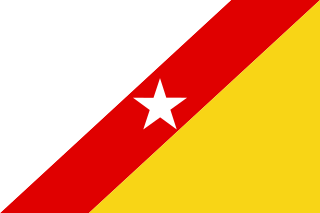 |
|---|
| This article is part of a series on the politics and government of Angola |
Legislature |
Judiciary |
|
General elections were held in Angola on 29 and 30 September 1992 to elect a President and National Assembly, the first time free and multi-party elections had been held in the country. They followed the signing of the Bicesse Accord on 31 May 1991 in an attempt to end the 17-year-long civil war. [1] Voter turnout was 91.3% for the parliamentary election and 91.2% for the presidential election. [2]

Angola, officially the Republic of Angola, is a west-coast country of south-central Africa. It is the seventh-largest country in Africa, bordered by Namibia to the south, the Democratic Republic of the Congo to the north, Zambia to the east, and the Atlantic Ocean to the west. Angola has an exclave province, the province of Cabinda that borders the Republic of the Congo and the Democratic Republic of the Congo. The capital and largest city of Angola is Luanda.

The President of the Republic of Angola is both head of state and head of government in Angola. According to the constitution adopted in 2010, the post of Prime Minister is abolished; executive authority belongs to the President who has also a degree of legislative powers, as he can govern by decree.

The Angolan Civil War was a civil conflict in Angola, beginning in 1975 and continuing, with interludes, until 2002. The war began immediately after Angola became independent from Portugal in November 1975. The war was a power struggle between two former liberation movements, the People's Movement for the Liberation of Angola (MPLA) and the National Union for the Total Independence of Angola (UNITA). The war was used as a surrogate battleground for the Cold War by rival states such as the Soviet Union, Cuba, South Africa and the United States.
Contents
The ruling People's Movement for the Liberation of Angola (MPLA) won both elections; however eight opposition parties, in particular the National Union for the Total Independence of Angola (UNITA), rejected the results as rigged. An official observer wrote that there was little UN supervision, that 500,000 UNITA voters were disenfranchised and that there were 100 clandestine polling stations. UNITA sent negotiators to the capital, but at the same time prepared measures to resume the civil war. As a consequence, hostilities erupted in Luanda and immediately spread to other parts of the country. Several thousand to tens of thousands of UNITA members or supporters were killed nationwide by MPLA forces in a few days, in what is known as the Halloween Massacre.

The People's Movement for the Liberation of Angola, for some years called the People's Movement for the Liberation of Angola – Labour Party, is a political party that has ruled Angola since the country's independence from Portugal in 1975. The MPLA fought against the Portuguese army in the Angolan War of Independence of 1961–74, and defeated the National Union for the Total Independence of Angola (UNITA) and the National Liberation Front of Angola (FNLA), two other anti-colonial movements, in the Angolan Civil War of 1975–2002.

The National Union for the Total Independence of Angola (UNITA) is the second-largest political party in Angola. Founded in 1966, UNITA fought alongside the Popular Movement for the Liberation of Angola (MPLA) in the Angolan War for Independence (1961–1975) and then against the MPLA in the ensuing civil war (1975–2002). The war was one of the most prominent Cold War proxy wars, with UNITA receiving military aid from the United States and South Africa while the MPLA received support from the Soviet Union and its allies.
















